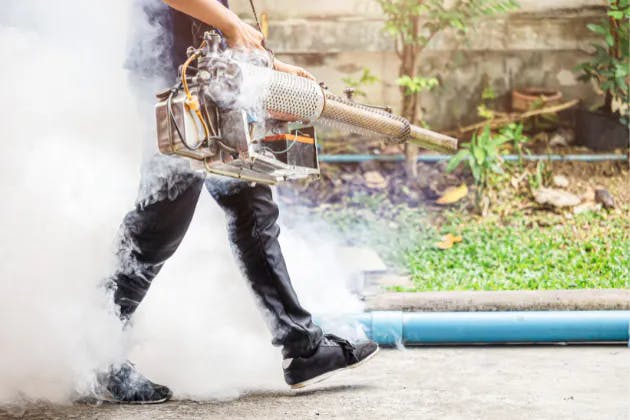Pest infestations can quickly escalate from a minor nuisance to a serious threat to your property and health. Recognising the signs of pest problems early and taking prompt action is crucial for effective control and prevention of further damage. Whilst some minor pest issues can be addressed with DIY methods, many situations require the expertise of professional pest control services. This article aims to guide you through the key indicators that signal it's time to call in the professionals, ensuring you can protect your home, health, and peace of mind from unwanted intruders.

Signs You Need Professional Pest Control
1. Visible Pests
Spotting pests in your home is a clear indication that professional intervention may be necessary. Whilst the occasional insect might not warrant immediate concern, frequent sightings of cockroaches, rodents, or bed bugs suggest a more severe problem. These pests often indicate larger populations hidden within your property.
Cockroaches, for instance, are nocturnal creatures. If you're seeing them during the day, it likely means their numbers have grown to the point where they're competing for space and food. Rodents, such as mice and rats, are similarly elusive. Regular daytime sightings could indicate a significant infestation.
Bed bugs, though small, leave distinct signs. Look for rusty or reddish stains on bed sheets or mattresses, dark spots (about this size: •), or live bugs in the folds of mattresses and furniture.
2. Droppings and Nests
Pest droppings are often one of the first signs of an infestation. Different pests leave distinct types of droppings:
- Rodent droppings: Small, dark, and pellet-shaped. Rat droppings are typically 12-18mm long, while mouse droppings are 3-8mm.
- Cockroach droppings: Resemble ground coffee or black pepper. They're typically found in kitchen cabinets, under sinks, or in dark corners.
- Bed bug droppings: Appear as small, dark stains on fabrics or surfaces.
Nests are another clear sign of pest activity. Rodents build nests using shredded paper, fabric, or other soft materials. These are often found in quiet, undisturbed areas like attics or wall cavities. Wasps and hornets construct distinctive papery nests in sheltered locations, such as under eaves or in sheds.
3. Property Damage
Pests can cause significant structural damage to your property. Termites, for example, can silently eat through wooden structures, compromising the integrity of your home. Signs of termite damage include hollow-sounding wood, bubbling paint, or tiny holes in woodwork.
Rodents constantly gnaw to keep their teeth sharp. Look for chew marks on wood, plastic, or even electrical wiring. This last point is particularly concerning as it can lead to fire hazards.
Carpet beetles and clothes moths can damage fabrics, leaving holes in carpets, clothing, and upholstery. If you notice such damage, it's time to consider professional pest control.
4. Unusual Noises
Many pests are more active at night, and their movements can often be heard in the quiet hours. Scratching, scurrying, or gnawing sounds in walls, ceilings, or under floorboards are typical signs of rodent activity.
Larger pests like squirrels or raccoons in attics or chimneys may create louder thumping or scratching noises. Buzzing or humming sounds could indicate the presence of a wasp or hornets' nest.
5. Strange Odours
Certain pests emit distinct odours. A musty, ammonia-like smell often indicates the presence of rodents. This is due to their urine and is particularly noticeable in enclosed spaces.
Cockroaches produce a oily, musty odour that becomes more pronounced as their numbers increase. Bed bugs have a sweet, musty scent, often described as similar to almonds or overripe raspberries.
Dead pests caught in wall cavities or other hidden areas can also produce foul smells. If you notice persistent, unexplained odours, it's worth investigating for potential pest activity.
Health Risks Associated with Pest Infestations
Allergies and Asthma
Many pests produce allergens that can trigger allergic reactions and exacerbate asthma symptoms. Cockroaches, for instance, shed skin and leave droppings that contain potent allergens. These particles can become airborne and inhaled, leading to respiratory issues, particularly in children and the elderly.
Dust mites, while not visible to the naked eye, are common household pests that feed on dead skin cells. Their faecal matter and body fragments are highly allergenic and can cause symptoms ranging from sneezing and runny nose to more severe asthmatic reactions.
Rodents also contribute to allergies. Their urine, saliva, and dander can trigger allergic responses in sensitive individuals. In some cases, these allergens can persist long after the pests have been removed, necessitating thorough professional cleaning.
Diseases and Infections
Pests can be vectors for various diseases, posing significant health risks. Rodents, in particular, are known carriers of numerous pathogens. Rats and mice can spread leptospirosis through their urine, a bacterial infection that can cause severe liver and kidney damage in humans.
Hantavirus, another rodent-borne disease, can be contracted by inhaling dust contaminated with rodent droppings or urine. This viral infection can lead to severe respiratory problems and, in some cases, can be fatal.
Cockroaches are not just unsightly; they can carry bacteria like Salmonella and E. coli on their bodies, potentially contaminating food and surfaces. They've also been linked to the spread of dysentery and gastroenteritis.
Mosquitoes, while often considered outdoor pests, can breed in small amounts of stagnant water around homes. They're known vectors for diseases such as West Nile virus and, in some regions, malaria.
Bites and Stings
Some pests pose direct physical threats through bites or stings. Bed bugs, while not known to transmit diseases, can cause itchy, painful bites that can lead to secondary skin infections if scratched excessively.
Wasp and hornet stings can be painful and, for some individuals, potentially life-threatening if they're allergic. Multiple stings can be dangerous even for non-allergic individuals.
Spider bites, while rare, can be serious depending on the species. The false widow spider, for instance, has become more common in the UK and can deliver a painful bite that may require medical attention.
Deciding When to Call a Professional Pest Control Company
Immediate Action Required
Certain situations demand immediate professional intervention. If you're dealing with a severe infestation, where pests are frequently visible or there's clear evidence of widespread activity, it's crucial to act quickly. This is particularly true for pests that pose significant health risks or can cause rapid structural damage, such as rodents or termites.
If you're experiencing adverse health effects that you suspect are related to pest activity, don't hesitate to call a professional. This is especially important if you have vulnerable individuals in your household, such as young children, elderly family members, or those with compromised immune systems.
Pest problems in food preparation areas, like kitchens or restaurants, require urgent professional attention due to the high risk of contamination and potential health code violations.
Preventive Measures
While immediate action is sometimes necessary, prevention is often the best approach to pest control. Regular professional inspections can identify potential pest issues before they become severe problems. These inspections are particularly important if you live in an area prone to certain pests or if your property has a history of infestations.
Professional pest control companies can implement preventive measures tailored to your specific situation. This might include sealing entry points, advising on proper food storage and waste management, or applying preventive treatments in high-risk areas.
For some pests, such as termites, regular professional inspections are crucial even if you don't suspect an active infestation. Early detection can prevent extensive and costly damage to your property.
Follow-Up and Guarantee
Effective pest control often requires follow-up treatments. Your pest control professional should provide a clear timeline for these follow-ups and explain their importance in ensuring complete eradication of the pest problem.
Many reputable pest control companies like ourselves offer guarantees on their services. This might include free re-treatments if pests return within a certain period or even money-back guarantees for certain types of treatments.
Regular follow-up inspections are also crucial, especially for pests known for persistent infestations or rapid reproduction. These inspections allow the technician to assess the effectiveness of the treatment and make any necessary adjustments to the pest control strategy.
FAQs
Contact Us
For professional pest control services across Bognor, Bournemouth, Portsmouth, Fareham, Guildford and all of Hampshire, call us at 02393092101. You'll be able to book your free pest inspection and protect your home from infestations with the help of our friendly specialists.


